- Home
- Eoin Colfer
Novel - Half Moon Investigations Page 3
Novel - Half Moon Investigations Read online
Page 3
Someone sat beside me. I was amazed to find it was April Devereux. She grinned, and I could see a lump of neon-blue chewing gum behind her perfect teeth.
“Hi, April. Are you in trouble, too?”
April shook her head, setting rows of pink beads in her hair rattling like snakes. “Hardly. I don’t do trouble. Just delivering a message for Fitz.” April pronounced message the French way.
Mr. Fitzgerald was our teacher. He thought allowing us to call him Fitz would make him cool and trendy. He had about as much chance of being cool as I had of winning Olympic gold in the high jump.
“I just stopped to ask how much you charge?”
“Charge?”
April pulled a ten-euro note from her pocket.
“For detective work. Like finding the organizer.”
“I suppose ten would be fair for today. I did put myself at considerable risk.”
April laughed. “Are you serious, Half Moon? I did-n’t hire you for that. You were soooo lucky with that cookie tin, by the way. A pedicure is thirty, so you’d be, like, a third that important. So I’ll give you this ten for a retainer. If you take it, then you work for me.”
I didn’t ignore the note, but I didn’t grab it either. I wasn’t really used to dealing with girls, unless I was questioning them about missing pencil cases or asking some of the rougher ones to give me back my lunch box.
“A retainer? To investigate what?”
April stood, flicking her hair over one shoulder. With her pink puff jacket on, she looked like a marshmallow.
“It’s more Sharkey trouble, I’m afraid. Not just the little stinky one. The whole family.”
I patted the pocket where my badge used to be. Red Sharkey was involved. I had already decided to investigate the Sharkeys, this could be a way to make a few euros while I was about it. Do a bit of snooping around for April, and dig up some dirt on Red. Who knows, I may even catch him red-handed with my badge. A couple of surveillance photos later, and the long arm of the law would be getting a lot shorter for Red.
“Okay,” I said. “Tell me all about this case.”
April had pulled out a compact mirror, and was checking her reflection.
“Bonjour,” she said to herself in the mirror. “How are you? You look great. Have you lost weight?”
I cleared my throat. “Hello. April. The case?”
April snapped the mirror closed.
“Sorry, Half Moon. I was just taking a moment to boost my self-esteem. I saw that on the mental health channel. The case. Well, I thought it was crazy at first, but there is definitely something strange going on in Lock.”
Suddenly the door light flashed green.
“Enter!” shrilled the principal’s voice through the door.
“I’d better go in,” I said, struggling out of the baby chair.
April caught my sleeve. “Come around to my house. After dinner.”
Another shout from inside. Louder this time.
“I’ll be there,” I said, reaching for the door handle. “About seven.”
“’Kay,” said April. “But don’t spread it around. We’re not, like, on the same level. I don’t want people to think we’re having a rendezvous or anything. You work for me, like a maid or something. A nerdy maid.”
I kept a straight face. Enduring disrespect was a detective’s lot. Still, April was exceptionally obnoxious. I was used to insults from my own age group, but April was only ten, and at least four inches shorter than me. And if you’re four inches shorter than me, then you’re short.
See you then, I thought, and entered the principal’s office smiling grimly. The badge would be mine again, even if I had to suffer April Devereux to get it.
* * *
Mrs. Quinn was moored behind an undersized desk from one of the elementary classrooms. The desk was swamped with report cards and official forms, and somewhere beneath the cables of her knitted cardigan, a phone rang. The principal ignored it.
The two Dobermans, Larry and Adam, stood at the principal’s shoulders. Without their muzzles on, it was clear that they actually were grinning.
I remembered why I was there and stopped smiling.
“Well, little Fletcher Moon,” said Mrs. Quinn delightedly. “What a nice surprise.” Then she remembered why I was there, and her expression turned hard. The dogs stopped smiling, too. Spittle hung in strings from their jaws.
Principals are able to switch moods in seconds. They would make excellent schizophrenics. “Do you have anything to say for yourself? Any extenuating circumstances, perhaps?”
I shook my head; getting someone else involved would be social suicide. “No. I just forgot where I was walking.”
Mrs. Quinn pointed to a small molded plastic chair in front of her desk. “Every day we lose another one. Sit.”
I sat. Another baby chair. My knees collided with my chin, clicking my teeth together.
Mrs. Quinn pulled a huge book from a drawer. It was covered with patterned velvet wallpaper.
“I’m going to show you something, Fletcher. This is my personal ledger. In this book I keep a record of every single child that ever passed through Saint Jerome’s.”
The book looked about a hundred years old. I half expected dragons to fly out when she opened it. Each page was divided into rows, one per child. After each child’s name was a series of boxes, with a picture drawn in every one.
“This is my own method of recording. It’s easy to review at a glance. I’m afraid you’ll be getting a general rowdiness picture today.” She hauled several yellowed pages across, until she arrived at the current students.
“Here we go. A fine crop of future world leaders.”
I suspected Mrs. Quinn was being sarcastic, but I couldn’t be sure. Maybe she had more faith in us than we had in ourselves.
“Look here. Lovely little May Devereux in fifth grade. Never caused a day’s trouble in her life.”
May was April’s first cousin. Their fathers were brothers and joined at the hip, and so were their daughters whether they liked it or not. They were even connected by the months of the year names, which their parents thought were impossibly cute. The school yard grapevine had it that April was embarrassed that May wasn’t quite as pink as she should be.
“Look at May’s pictures. An abacus, because she’s such a good little math scholar. A pair of dancing shoes, because she danced in last year’s talent show. And an angel, because that’s what she is. Not many people have pictures like May Devereux.”
I was starting to get the picture. Pardon the pun.
“Oh, I see,” I said, pointing to another row of pictures. “There’s Dermot Carmody. There’s a picture of him sitting by the fire, because he got a summer job in Riley’s Bakery.”
Mrs. Quinn sighed, disappointed. “No, Fletcher. Wake up, boy. Those are the flames of hell. Dermot dropped out of school, so that’s where he’s headed. See the little horns?”
“Aah,” I said, holding on to the chair in case my legs decided to get up and run away.
Mrs. Quinn pointed to another row of tiny pictures. “Here’s Red Sharkey. You see what his first picture is?”
I leaned in to see. In the box was a crude drawing of an agitated stick figure. “General rowdiness,” I guessed.
“Well done, Fletcher. Top of the class. General rowdiness. That’s how it always starts. A harmless bit of playacting. But before you know it, you’re on to the serious stuff, just like Red. Fighting, cutting class, suspension.”
There was a picture for each crime. Suspension was wittily displayed by a lynched stickfigure.
“And now, on to Fletcher Moon. What do we have here? Only good things. Look, a little bee. . . .”
“I won the spelling bee in first grade.”
Mrs. Quinn punched me playfully on the shoulder. I almost fell out of the baby chair.
“Now you’re getting it, Fletcher. Who says you’re thick? And next we have a little magnifying glass. Because?”
Another
easy one. “Because I was forced to . . . Because I volunteered to find your keys last year.”
Mrs. Quinn dealt me another jokey blow. I felt my arm go numb. The principal selected a chubby stump crayon from the pack and drew a general rowdiness stick figure in my third box.
“Now, Fletcher,” she said sadly. “You are branded forever. Let’s hope that this is as far as it goes. I wouldn’t like to see you following the same pattern as Red.”
“No, ma’am.”
“We don’t want you ending up with the flames of hell, or in a little nee-naa.”
“Police car?”
“Exactly. It’s really quite a scientific system. I can read trends and predict behavior. Sometimes I punish people in advance, because my little boxes tell me what they’re going to do.”
I felt it was time for a speech. “Don’t worry about Fletcher Moon, ma’am. I’ve learned my lesson. No more stick figures for me.”
Mrs. Quinn shut the ledger with a thump. “I hope not. Now off you go. You didn’t see who was next, did you? I do hope it’s a naughty child so I can really enjoy administering the punishment. I couldn’t bear another fallen angel.”
The feeling was returning to my arm. That feeling was pain.
“I was the only one, unless someone arrived while I’ve been in here.”
“Only one way to find out,” said Mrs. Quinn, bright-eyed. She flicked the door light from red to green.
As the door closed behind me, I didn’t know who to be sorry for, Mrs. Quinn or whoever was next in to see her. In the hallway, a kindergartner with tousled hair and a bloody nose was sucking his thumb.
“Enter!” howled the principal at the top of her lungs. Larry and Adam took up the howl until it echoed down the hall.
I’M ON THE CASE
MY MOTHER WORRIES about me. She worries that I’m not going to grow, or that I’m going to hit a spurt and cost her a fortune in new clothes. She worries that I don’t have many friends, and she worries about my fascination with crime.
I try to smile when she’s around to show how happy I am, but I’m not really a smiler so she knows I’m faking. So then I don’t smile and she follows me around asking what’s wrong.
That day, when she came to my room to check homework, for once I was able to tell her something that made her happy.
“I’m going over to April Devereux’s house after dinner.”
Mom was ecstatic. “Oh my God. April Devereux. April and May are the cutest names. It takes a lot of guts, as a parent, to give your children names like that, but if they turn out pretty then it’s worth the risk. What are you going to say?”
“Nothing. I’m going to listen. April wants to talk to me.”
Mom waved her hands in the air in thanks. “April Devereux wants to talk to my little Fletcher. She’s so pretty. Perfect. You have to say something, honey. You can’t sit there nodding for the evening.”
I was beginning to wish I hadn’t mentioned my appointment.
“I will respond to the situation, Mom. Whatever comes up.”
Mom drew a horrified breath. “Oh, no you don’t. I know how you respond to situations, Fletcher Moon. You make one of your observational deductions. You told your cousin Eve that she had a calcium deficiency.”
“She did. There were white spots on her nails. I was just trying to help.”
Mom shook me by the shoulders, then squeezed me tight. “Trust me, honey. That isn’t what girls want to hear. Just tell us we look fabulous as often as possible.”
I frowned. “Even if it’s not true?”
Mom pulled three of my shirts from the closet. “Especially if it’s not true. Now, which one?”
I pointed to a plain black shirt, which I would wear with plain black jeans. Be invisible.
“Mom, you should maybe calm down a little. It’s not a social call. April wants my help. She’s a client. And she’s only ten.”
Mom rolled her eyes. “Men. Such simpletons. Honestly. Do you think I told your father that I thought he was handsome? No. I told him I needed his help with physics.”
“And Dad fell for that?”
“Of course he did. He wanted to fall for it, and I didn’t even take physics.”
Mom was an interior decorator who ran her own business from the garage. Dad was a computer engineer with a local company that made memory boards. They were an unlikely match. Art and science. Heart and hand.
My sister, Hazel, stomped into my room, not bothering to knock. She was fifteen, an aspiring writer, and a full-time drama queen. Hazel could be found at any given hour either hunched over her antique typewriter or fending off the droves of adolescent boys that she attracts with her fine features and blond hair. Fending off all except her beloved Stevie.
Hazel took a sheet of paper from her bag.
“I need your professional opinion, Fletcher,” she said, handing me the folded note. Hazel was perhaps the only person in the world who took my profession seriously. Except perhaps April Devereux, now.
I unfolded the paper and read a note from Hazel’s boyfriend.
Dear Hazel,
I am so sorry about the movies last night. Dad made me stay in and write my history assignment about the Battle of the Somme in World War II.
I will make it up to you. Next weekend let me take you for dinner at Le Bistro. My treat.
XXXXX
Stevie
I rubbed the page between my fingers, then smelled it.
“Well?” demanded Hazel. “What do you think?”
I scratched my chin. “I would have to say, dump him.”
Hazel stamped her foot. “I knew it!” she whined. “How do you know?”
“There are several clues. First he blames his father, which is classic transference. Then he refers to the Battle of the Somme, which took place in World War One, not Two—something Stevie would know if he had actually completed his assignment. Also specific references such as the essay title are commonly woven into false stories to make them sound real. In fact they provide the detective with more ways to trip up the subject.”
“This is all pretty circumstantial.”
I took a pot of graphite filings from my desk. “I’m not finished yet,” I said. “Stevie offers to bring you to Le Bistro, which is gross overcompensation. That has guilt written all over it. The letter smells faintly of perfume, Happy by Clinique, which is not one of yours, which leads me to believe he has been holding hands with another girl. Finally, I feel indentations in the page. I suspect that our Stevie made more than one attempt to write this letter. Perhaps he was even going to tell the truth before he lost his nerve.”
I laid the page flat on my desk, shaking graphite filings over its surface. After a slow count of ten, I tipped the filings into the wastepaper basket. Not all the filings ran off, some caught in the indents.
“This is what was written on the page before this one in the pad. Only two lines are legible. I think you will find that the handwriting is the same.”
Hazel took the sheet, reading the faint black writing aloud. “Dear Hazel, I don’t know how to tell you this, but I have met some . . .” My sister ripped the note into shreds, tossing it into the air like confetti.
“He’s met someone else, has he?” she said, pulling a cell phone out of her pocket. “Someone who wears Happy. It should take me about five minutes to find out who.” She handed me a Mars bar. “Thanks, little brother. For that I won’t tease you for an entire day.”
“I’d prefer actual money,” I said.
“I can’t pay you,” said Hazel, skipping across the hall to her own room. “It would be exploitation of child labor.”
The door closed behind her.
Mom sighed. “We won’t see her for days. Hazel will get at least a one-act play out of this.”
I knelt to gather the shreds of paper. “Do you see how complicated things become when people get involved in relationships, Mom? My business is just taking off and I want to concentrate on that, so I think I’ll give th
e relationships a pass for a few years, if you don’t mind. April Devereux is a client, that’s all.”
“Okay,” said Mom. “But wear something with color. Think ahead. You never know.”
How do you know if you’re a detective? What sets us apart from the everyday people? My theory is that most people like to dwell on the brighter side of life. They want to concentrate on the rug, and not on the dirt swept underneath. Not detectives. We want to pull back the rug and put the dirt in a forensics bag. Then we want to run over the floorboards with a sticky roller just in case some of the dirt got away. We are social scientists. We like to take people apart to see what makes them tick. You don’t have to be particularly smart to be a detective, you just have to want to do it.
April lived on Rhododendron Road. A name that must have started out as a joke and then stuck. It took twenty-five minutes to walk along Lock’s historic wooden works and across the town bridge, and with every step I thought about my badge.
April’s house was a large manor-style building, complete with manicured lawns and a tree-lined avenue. The drive was covered with raked white gravel, and flower beds swirled along both sides drawing the visitor toward the front porch.
I crunched down the drive only to be told by the gardener that April was next door at her cousin’s, but had left a note for me. The note was on scented pink paper with a unicorn watermark. April Devereux was printed in dark-pink flowing script across the top.
Dear Half Moon,
Follow the yellow brick road.
A (April)
It was not very encouraging, I decided, if your employer thought you were too thick to figure out that A stood for April. Especially at the bottom of a note from April, on April’s personally monogrammed paper.
The yellow brick road was a sandstone path that wound through the white gravel, leading to a gate in the wall between April’s and May’s houses. The gate was unlocked and I pushed through to a house pretty much identical to the first one.
April’s cousin May ran down her side of the yellow brick road, just as I closed the gate.

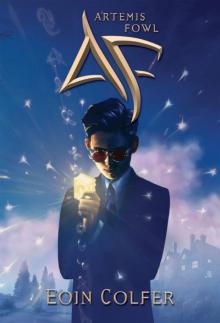 Artemis Fowl
Artemis Fowl Plugged
Plugged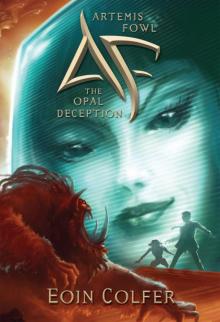 The Opal Deception
The Opal Deception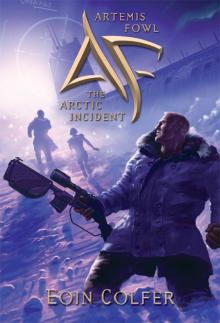 The Arctic Incident
The Arctic Incident The Wish List
The Wish List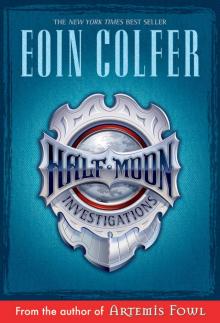 Novel - Half Moon Investigations
Novel - Half Moon Investigations The Supernaturalist
The Supernaturalist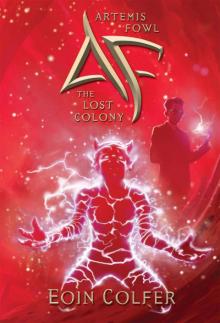 The Lost Colony
The Lost Colony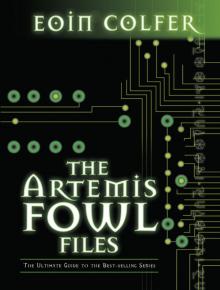 The Artemis Fowl Files
The Artemis Fowl Files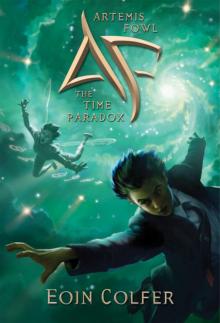 The Time Paradox
The Time Paradox The Atlantis Complex
The Atlantis Complex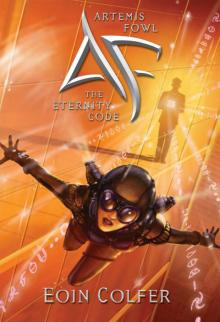 The Eternity Code
The Eternity Code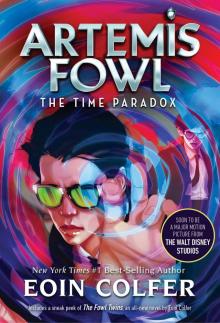 The Time Paradox (Disney)
The Time Paradox (Disney)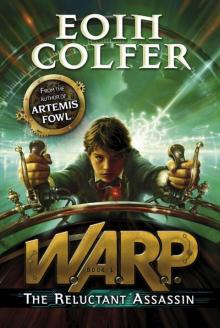 The Reluctant Assassin
The Reluctant Assassin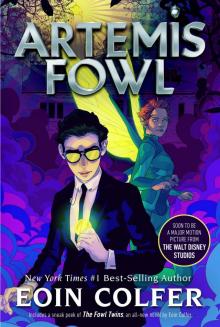 Artemis Fowl (Disney)
Artemis Fowl (Disney) Highfire
Highfire The Last Guardian
The Last Guardian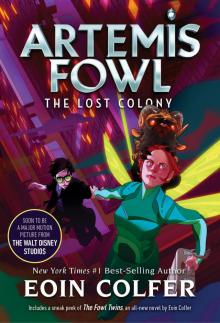 The Lost Colony (Disney)
The Lost Colony (Disney)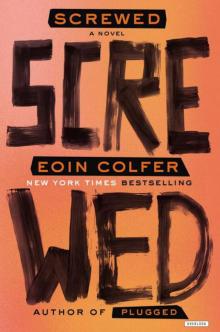 Screwed: A Novel
Screwed: A Novel Novel - Airman
Novel - Airman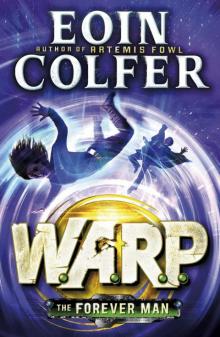 The Forever Man
The Forever Man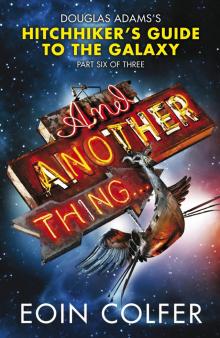 And Another Thing...
And Another Thing...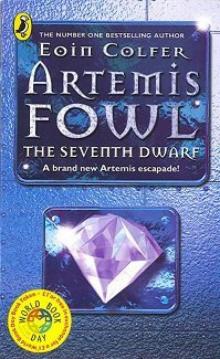 The Seventh Dwarf
The Seventh Dwarf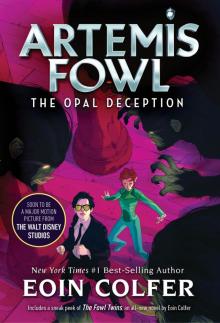 The Opal Deception (Disney)
The Opal Deception (Disney)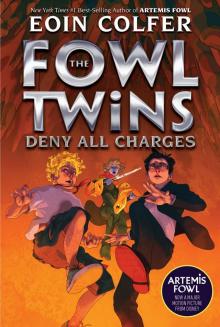 The Fowl Twins Deny All Charges
The Fowl Twins Deny All Charges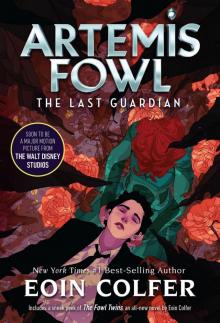 The Last Guardian (Disney)
The Last Guardian (Disney) The Hangman's Revolution
The Hangman's Revolution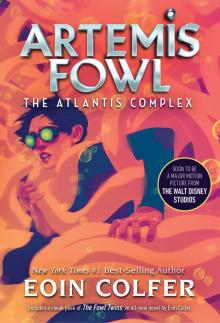 The Atlantis Complex (Disney)
The Atlantis Complex (Disney)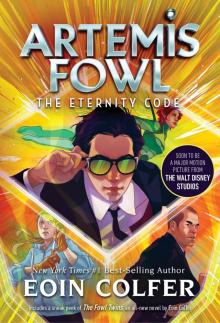 The Eternity Code (Disney)
The Eternity Code (Disney)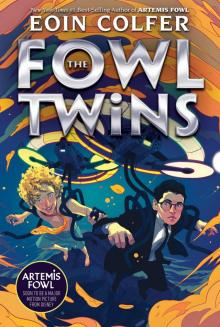 The Fowl Twins
The Fowl Twins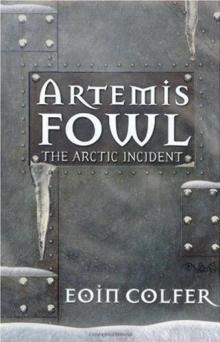 Artemis Fowl. The Arctic Incident af-2
Artemis Fowl. The Arctic Incident af-2 Artemis Fowl and the Atlantis Complex af-7
Artemis Fowl and the Atlantis Complex af-7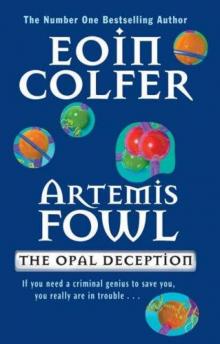 Artemis Fowl. The Opal Deception af-4
Artemis Fowl. The Opal Deception af-4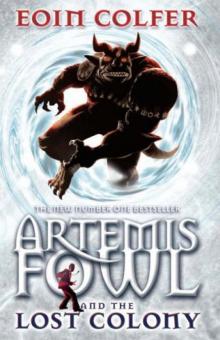 Artemis Fowl. The Lost Colony af-5
Artemis Fowl. The Lost Colony af-5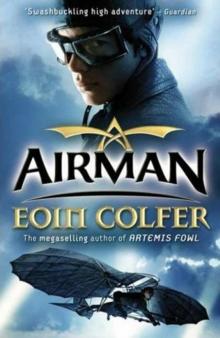 Airman
Airman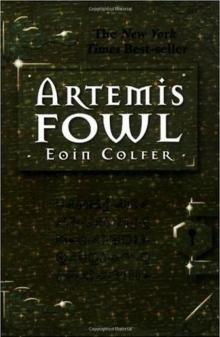 Artemis Fowl af-1
Artemis Fowl af-1 Artemis Fowl: The Eternity Code af-3
Artemis Fowl: The Eternity Code af-3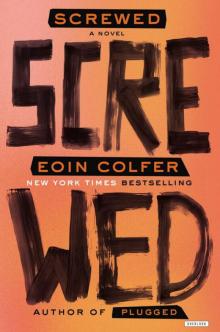 Screwed dm-2
Screwed dm-2